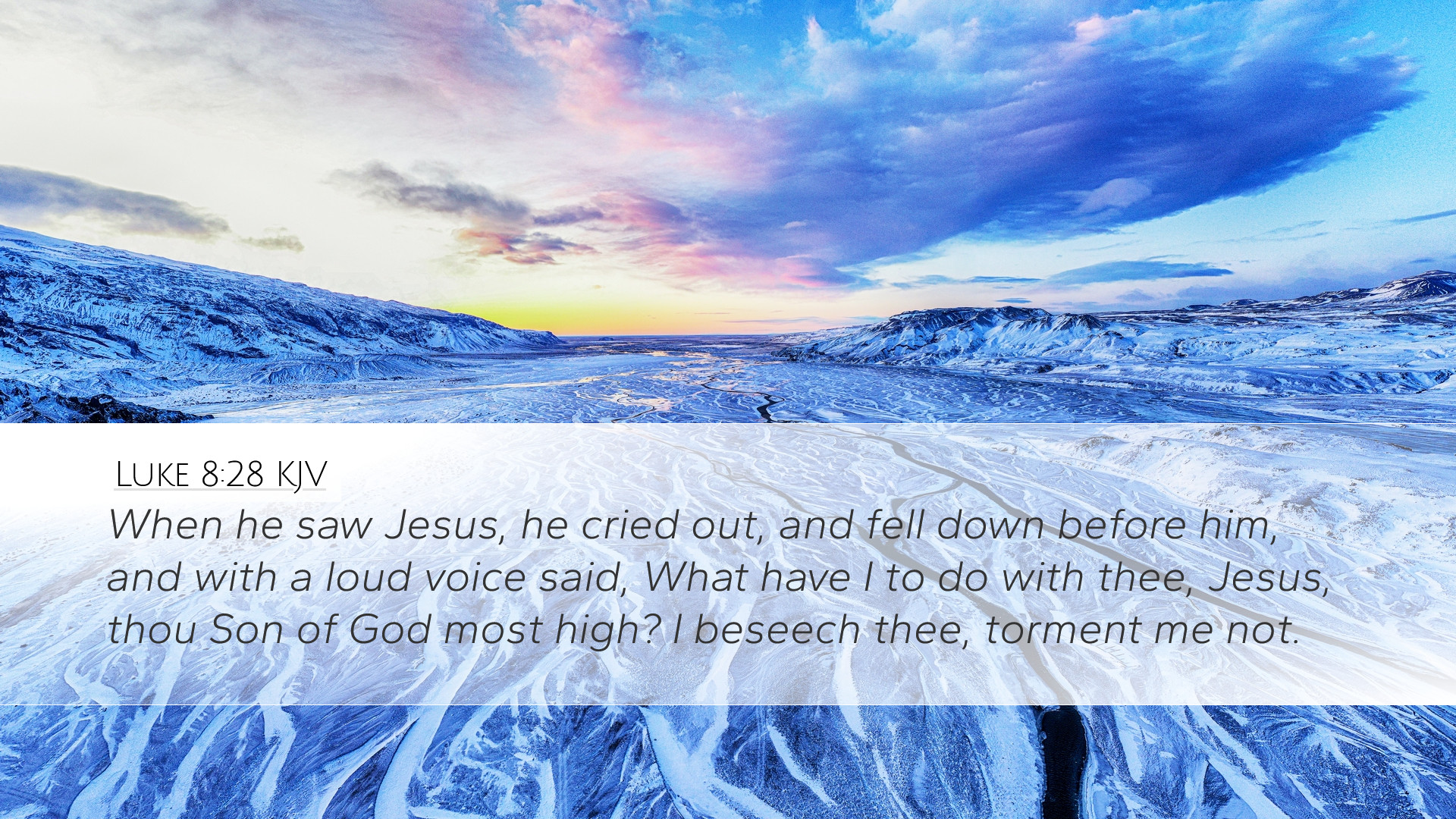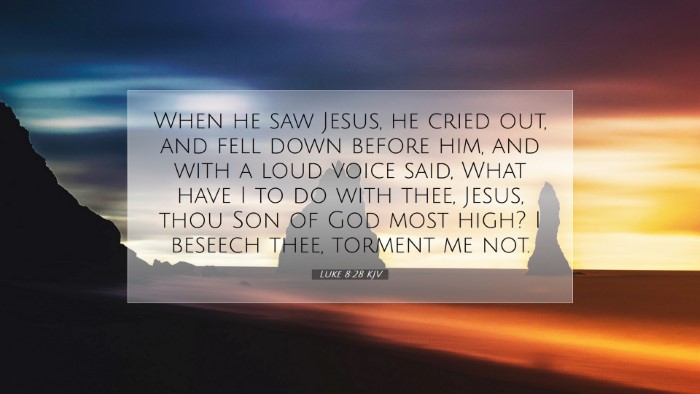Commentary on Luke 8:28
Luke 8:28, which reads, “When he saw Jesus, he cried out and fell down before him, and with a loud voice said, 'What have I to do with you, Jesus, Son of the Most High God? I beg you, do not torment me!'” (NKJV), presents a profound encounter between the demoniac and Jesus. This verse encapsulates the theme of spiritual warfare, the authority of Christ, and the recognition of His divine identity.
1. Contextual Overview
The setting of this miracle is crucial for understanding the dynamics at play. Jesus and His disciples have just crossed the Sea of Galilee, heading to the region of the Gerasenes (or Gadarenes). Here, they encounter a man possessed by a multitude of demons, illustrating the stark contrast between Christ's divine authority and the suffering brought about by demonic influence.
2. The Demoniac's Recognition of Jesus
The immediate response of the possessed man to Jesus’s presence is significant. According to Albert Barnes, this reaction demonstrates the universal recognition of Christ’s authority by the spiritual realm. The demons within the man acknowledge Jesus as the “Son of the Most High God,” a title that encapsulates His divine nature and authority. Matthew Henry notes that even the demons are not ignorant of who Jesus is, highlighting the theme that despite human disbelief, the spirits recognize His sovereignty.
Spiritual Dynamics
The exclamation of the demoniac reveals a fundamental truth about the heavens and the earth: all beings, seen and unseen, acknowledge the supremacy of Christ. The phrase “What have I to do with you?” reflects an acknowledgment of the cosmic confrontation between good and evil; the demon is aware that his time is short before divine judgment.
3. The Cries of Desperation
The loud cry of the demoniac not only signifies recognition but also desperation. Adam Clarke emphasizes that the plea, “I beg you, do not torment me!” reveals the demons' fear of future torment, which aligns with their understanding of Jesus’ power over them. The fear expressed by the demoniac stands in stark contrast to the peace and authority that Jesus brings.
Symbolism of Torment
This torment can be interpreted as both a present reality and an eschatological expectation. The demons know that Jesus has the power to cast them out and ultimately to consign them to eternal judgment. Matthew Henry suggests that this not only pertains to the individual’s current state of torment under demonic influence but also hints at the eschatological truth concerning the eventual fate of all evil—eternal separation from God.
4. Theological Implications
From a theological perspective, Luke 8:28 offers profound insights into the nature of Christ’s ministry. It underscores Jesus’ authority over demonic forces, a central theme throughout the Gospel of Luke. The instance of the demoniac challenges believers to consider the reality of spiritual oppressions and the assurance that Christ, as the Son of God, holds ultimate power over such forces.
Authority of Jesus
The confrontation encapsulated in this verse reflects Jesus’ mission: to confront the powers of darkness and establish His Kingdom. Albert Barnes notes that the passage illustrates the implicit promise of freedom from bondage to sin and demonic forces, resonating deeply with those struggling under spiritual oppression.
5. Practical Applications
This account in Luke 8:28 offers several practical applications for contemporary readers:
- Awareness of Spiritual Warfare: Believers are called to recognize the spiritual battles that manifest in various forms and to understand that Christ predominates over all forces of darkness.
- Faith in Christ's Authority: Just as the demoniac appealed to Jesus, Christians are reminded of the importance of invoking the name and authority of Jesus in times of crisis or spiritual turmoil.
- Compassion for the Oppressed: This passage compels believers to approach those who are spiritually and emotionally troubled with compassion, reflecting Christ’s love and power to transform lives.
6. Conclusion
In summary, Luke 8:28 serves as a testament to Christ’s supremacy and authority over evil, providing comfort and hope for believers facing spiritual struggles. The acknowledgment by the demoniac of Jesus’ identity fosters a profound understanding of the tension between good and evil and emphasizes the necessity of recognizing Christ’s power in every aspect of life. Pastors, theologians, and students of the Word are encouraged to meditate on this passage, drawing insights that inform both doctrinal understanding and practical living.


